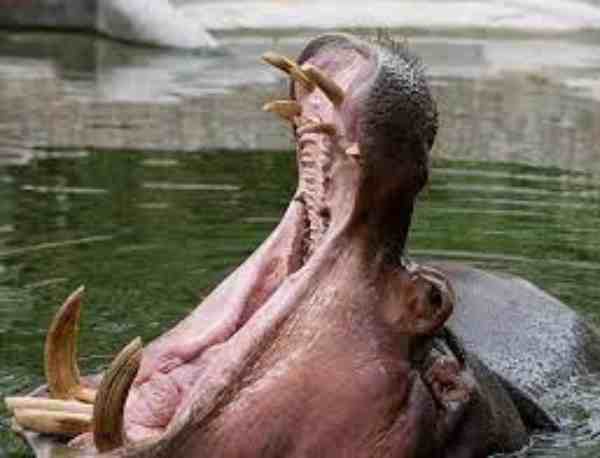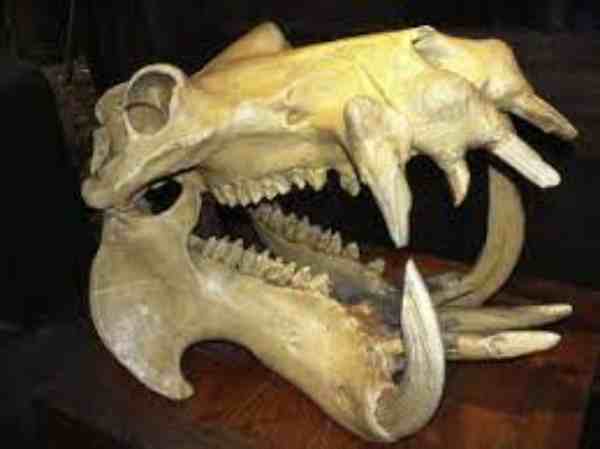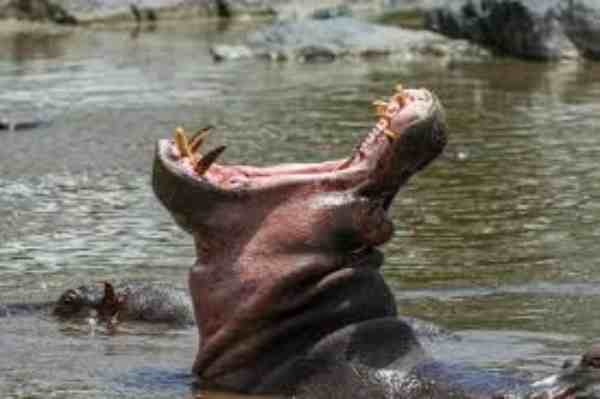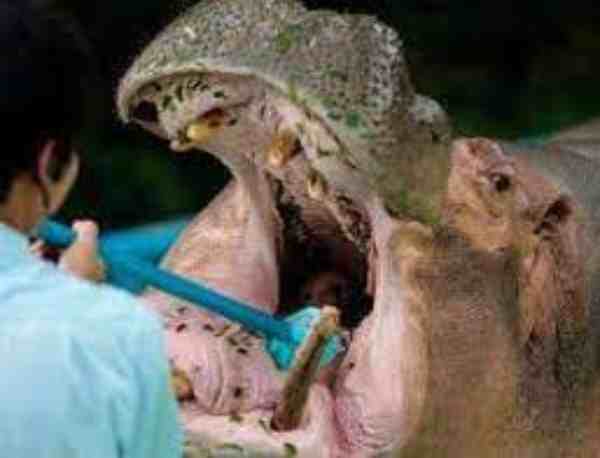Due to their immense size, it’s no wonder that hippopotamuses are one of the most dangerous animals on earth. In addition to their intimidating appearances, they also have an unusual-looking mouth that is equipped with long, sharp canines. Although these giant mammals are herbivores, Hippopotamus teeth can cause serious damage if they were to attack.
Table of Contents
These creatures are massive and weigh up to 4.5 tons, which is almost double the weight of an average-sized car. Given their size and strength, it is not surprising that hippos are one of the most dangerous animals in Africa. Although they are herbivores and typically only eat plants, they have been known to attack and kill humans who get too close. They are also very aggressive towards other animals and have been known to kill lions and even elephants.

Hippopotamuses Have What Kind of Teeth?
The typical dental formula for a hippopotamus is 2 incisors, 1 canine, 3-4 premolars, and 3 molars in each quadrant, for a total of 36 teeth. However, some hippos retain their deciduous teeth even after the permanent teeth have erupted, which can result in more teeth. The deciduous teeth can stay in place for many years.
The dental pattern of a hippo is essential for their survival since they are primarily herbivores. Their large incisors and.. strong canines are necessary for biting and cutting tough vegetation. Meanwhile, the molars are used for grinding food. Although their teeth are vital for their diet, they also use them as weapons. The long canine teeth can be up to 50cm long and are often used for fighting rivals or predators.

For What Purpose Do Hippopotamuses Use Their Teeth?
A hippopotamus’s mouth might be its most dangerous weapon. These massive animals are equipped with two sets of teeth that serve different purposes. The first, a set of flat molars, are used for crushing and grinding plant matter. Given that a hippo can eat up to 50 pounds of vegetation in a single day, these molars see a lot of use.
The second set of teeth, a pair of long canines, is not used for eating at all. These teeth are also referred to as “cheek teeth”. With a diet consisting entirely of plants, there is no need for sharp carnivorous teeth. Instead, these foot-long tusks are used as weapons, both for fighting other hippos and for deterring predators.
The hippo’s upper incisors and lower canines are shown by its huge tusks, which can grow up to a meter long. Hippos grind these sharp teeth together to keep them in good shape. Because of this, they can hurt both people and other animals very badly. Hippos, on the other hand, don’t eat meat, even though they look scary. Their big, horny lips help them grab grass, which their cheek teeth then chew.

What are the Teeth of a Hippopotamus Made of?
The tusk of a hippopotamus is actually its canine tooth, which is the largest tooth in its mouth. These canines can grow to be up to one meter in length and can weigh up to 30 kilograms. The tusks are made of ivory, which is a hard, white material that is also found in elephant tusks. The ivory is covered by layers of dentin and enamel, which protect the tooth and give it its white color.
Hippopotamus teeth or ivory have been prized by humans for centuries, and their unique properties have made it a popular material for a variety of uses. Unlike elephant ivory, hippo ivory is much denser and less prone to wear.
This makes it an ideal material for constructing dentures and other medical appliances. However, the high demand for hippo ivory has had a devastating impact on the populations of the animals. In the 18th century, massive numbers of hippos were hunted for their tusks, and the animals were nearly driven to extinction.
Hippo Bite Strength: How Dangerous Is It?
It’s no wonder that hippopotamus teeth produce one of the strongest biting forces in the world, with a 1,800 PSI or 8,100 Newtons bite. That’s way greater than a lion’s 650 PSI bite force, and even surpasses a polar bear’s 1,200 PSI.
The hippopotamus is one of the most feared animals in Africa, and for good reason. These massive creatures are armed with razor-sharp teeth that can easily slice a human in half. And, if that wasn’t enough, they can impressively open their jaws between 150 and 180 degrees. making them even more dangerous. During an aggressive display of power, a hippopotamus will often show off its teeth, making it clear just how deadly it can be.

How Long Are the Teeth of Hippos?
The hippopotamus teeth are really impressive, with the front teeth growing up to an incredible 1.2 feet long. The canines or tusks can grow even longer, reaching up to 1.5 feet in length. This makes the hippopotamus teeth the largest among all the land mammals.
Males often engage in aggression in order to assert dominance and secure resources like food and mates. One way that they show their strength is through the size of their teeth. Male hippopotamuses frequently flaunt their larger teeth in aggressive displays of dominance because they have larger teeth than females. The tusks can be up to 1.5 meters long, and they are sharp enough to inflict serious damage.
Do Hippopotamus Teeth Grow Constantly?
A hippopotamus’ teeth are fascinating since they continuously grow throughout its lifetime. The front teeth and tusks are what primarily grow, but the premolars and molars don’t. Even though cheek teeth have enamel protection, they remain susceptible to wear.
If a hippopotamus grinds too much, the molars can become worn down and make it difficult for them to eat properly. This could then lead to starvation. It’s interesting to note that a hippopotamus’ incisors and canines are mostly used for display purposes and aren’t as sharp as one might think.
How do hippos clean their teeth?
Hippos are one of the few animals that appear to produce their own sunscreen. This natural sunblock is produced by a gland in their skin, and it helps to protect them from the harsh African sun. However, this sunscreen does not provide protection against other elements, such as dirt and debris.
Unfortunately, they don’t have access to toothpaste or toothbrushes, so they must make do with what they have. Hooves are not the best tools for cleaning, but they are all that hippos have. In captivity, some hippos get help from zookeepers who brush their teeth for them. But in the wild, hippos must fend for themselves.
Thankfully, nature has provided a solution in the form of fish like barbels. These helpful creatures will nibble away at the dead skin and parasites, providing a much-needed cleaning service for the hippo. In return, the fish get a meal of their own.

Do Hippopotamuses Bite Humans?
Though they may seem comical with their enormous size and big mouths, hippos are some of the most dangerous animals in the world. While they are herbivores, they are incredibly aggressive, and their large jaws are capable of inflicting serious damage.
In fact, hippos kill an estimated 500 people each year in Africa alone. However, despite their reputation as fierce predators, hippos are actually quite vulnerable. Their populations are rapidly declining due to habitat loss and conflict with humans.
Read our other Hippo blogs below:
- Do You Know How Fast Can a Hippo Swim?
- Can You have a Pygmy Hippo Pet?
- How Wide Can a Hippo Open its Mouth? Let’s Explore
- Hippo Life Cycle | What is The Lifespan Of A Hippo?
- Hippo vs Saltwater Crocodile: Key Differences (And Who Would Win in a Fight)
References:
https://study.com/learn/lesson/hippopotamus-teeth-diet-facts.html
https://www.nationalgeographic.com/animals/article/wildlife-watch-hippo-teeth-trafficking-uganda
https://www.sciencedaily.com/releases/2016/09/160912084626.htm
https://www.nytimes.com/1964/11/29/archives/bringing-home-the-hippo.html
https://www.nature.com/articles/nature.2017.22168
https://www.earth.com/news/million-year-old-tooth-is-the-earliest-evidence-of-hippos-in-the-uk/
https://www.theguardian.com/tv-and-radio/2016/dec/11/planet-earth-ii-hairiest-moments-david-attenborough

Zahra Makda
Growing up enjoying the beauty of my village, a good passion for nature developed in me from childhood. Following my passion for the natural world, I have chosen zoology for my graduation, during my undergraduate degree, I participated in many nature trails, bird watching, rescues, training for wildlife conservation, workshop, and seminars on biodiversity. I have a keen interest in invertebrate biology, herpetology, and ornithology. Primary interests include studies on taxonomy, ecology, habitat and behavior.









